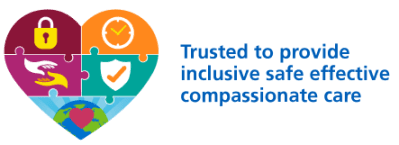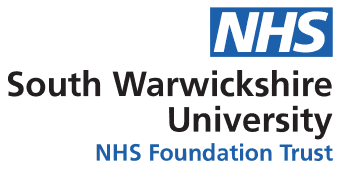Staying in hospital for longer than necessary can cause serious harm, impacting on a person’s health and wellbeing.
- Up to 60% of older patients experience functional decline after hospitalisation
- If you are over 80, 10 days of bed rest equals 10 years of muscle aging
- Hospital inactivity = accelerated bone loss, malnutrition, delirium, sensory deprivation, and incontinence
- Vulnerable adults can lose as much as 5% muscle strength per day to hospital acquired deconditioning
- The 1,000 days campaign highlights that elderly people, the chronically ill, and those with life-limiting conditions are the same people who spend the most time in healthcare settings. These are the very people who have the least time to waste.
Acute hospitals are very busy, unfamiliar environments, which can cause confusion and disorientation.
This can mean that people get less rest because on many wards, our teams are in and out all through the night, caring for the very unwell. Our services are designed to treat the acute phase of illness or injury, not for recovery and recuperation.
It's important to remember that most patients will continue to recover at home once they leave an acute hospital. This is medically safe, appropriate and necessary to improve long-term health and wellbeing outcomes for patients. In fact, many patients will need to leave hospital to be able to recover fully.
Staying in hospital for longer than necessary has a negative impact on how well patients recover. Ensuring that patients are given the chance to continue their lives at home is vital for their long-term wellbeing outcomes. We want to empower patients and their families with the confidence to continue their recovery in a familiar environment.
Sometimes, patients’ families can help us to get them home more quickly, by providing a little assistance to allow this to happen. You won’t be on your own because there’s a wide range of support available to you.
Meet Barrie Wills, a patient on the Community Recovery Service (CRS) pathway who believes there is no place like home. Barrie engages in therapy exercises within the comfort of his own home with the help of Adam Newberry, Therapy Assistant Practitioner.
The video discusses the impact of the Community Recovery Service (CRS) and how SWFT are among six leading trusts dedicated to enabling patients to recover in their home environment after a hospital stay.
Deconditioning is a decline in function and for older people with frailty, this may start within hours of their lying on a trolley or bed. Up to 65 per cent of older patients experience decline in function during hospitalisation. Many of these patients could prematurely end up in a care home because of ‘deconditioning’ and the loss of functional abilities while in hospital.
Acute hospitals are very busy, unfamiliar environments, which can cause confusion and disorientation. Our services are designed to treat the acute phase of illness or injury, not for recovery and recuperation.
Physical strength
If you stay in bed for long periods, you lose mobility, fitness and muscle strength, which makes it harder for you to regain your independence. Getting up, dressed and moving helps maintain muscle strength and your ability to do things for yourself.
When you’re at home, just doing ordinary day-to-day activities helps to maintain muscle strength, even things like getting up to make a cup of tea. In contrast, when you’re in an unfamiliar environment like a clinical ward, you may be more likely to fall because you don’t have those familiar things around you to steady you if you lose your balance for a moment.
Rest
Good sleep is essential for a long and healthy life but it’s even more important when you're recovering from an injury or illness. Hospitals are busy places with lights, talking and noises from equipment, which can cause sleep deprivation. There’s no bed like your own bed when it comes to getting a good night’s rest.
Mental wellbeing
Being in familiar surroundings with support from your loved ones is one of the best things for mental wellbeing. Hospitals are unfamiliar and can be very confusing which increases your risk of developing delirium (sudden confusion). When you are in hospital for a longer period, you may also lose confidence in your own ability to manage your day-to-day needs. With the right support, many people can return to living their life the way that they want to.
Infection
When you're unwell you're often less resistant to infections. We do everything we can to prevent you from developing an infection but the risk is usually lower at home where there are fewer unwell people under one roof.
Before you leave hospital
- Do you know where you are going (to home, to interim care, to a community hospital)
- Do you have your own transport?
- Do you have your medication and do you understand when to take it?
- Do you have the equipment you need to go home?
At the home
- Is the heating on?
- Are the lights on?
- Is there basic food in the fridge?
Concerns
- If you are unwell and need medical help, please call 111 or visit 111.nhs.uk
- If you are not unwell, but you feel you are struggling to cope at home, please go to Help when leaving hospital – Warwickshire County Council.
- If you are unsure about your medication, please call 111 and ask for the Pharmacy Helpline.
Continence Service
The Continence Service operates an open referral system offering advice and treatment for adults aged 18 years and above. The service covers Warwickshire South, Warwickshire North, and Rugby.
Referrals
Referrals can be made through GP or a self-referral
Operating times
08.30am to 4.30pm Monday to Friday
Contact details
Tel: 01926 600818, option 6 specialist – option 6 Continence
Community Response Team (CRT)
The Community Response Team (CRT) aims to move care closer to home and reduce / prevent prolonged acute hospital stays. CRT facilitate discharge from an acute hospital and prevent hospital admission by assessing patients in their own home. Once assessed the team of nurses, clinical support workers and therapists will prescribe and deliver short-term care of up to 6 weeks dependent on the needs of the patients.
Referral criteria
- Over the age of 18
- Be a patient with a South Warwickshire GP
- Medically stable
- Safe to remain in own home
- The patient must be able to participate in rehab
- End of life support
- Admission avoidance/Facilitated discharge
Operating times
08:30am to 09:30pm, 7 days a week, 365 days a year.
You must be referred by a General Practitioner, Advanced Clinical Practitioner, District nurse, Ambulance service, or an acute setting via the integrated single point of access (iSPA).
Dementia Specialist Nursing
The service provide dementia care in a person's home. Referrals accepted from GPs, hospitals, Memory Service colleagues, social services, third-sector organisations, Care coordinators and other health and social care professionals.
Families discharged from the service can self-refer back into the service if their needs change.
Operating times
08:00am to 06:00pm, Monday to Friday
Contact details
01926 495321 ext 5945. Please leave a name, number and a short message.
Heart Failure Specialist Nurse Service
The Heart Failure Specialist Nurse Team supports patients with a confirmed diagnosis of heart failure across South Warwickshire.
Patients are seen in nurse-led clinics across the area, aiming to be the most accessible to where they live. The team also offer home visits to those who cannot attend the clinic.
Operating times
Monday to Friday between the hours of 8 am to 4 pm
Referrals
All referrals must come through the iSPA, either by telephone call or via email. The team accept referrals from Clinical staff, GP’s patients, next of Kin and external organisations.
On receiving a referral it will be triaged by a Specialist nurse and either accepted or declined. If the referral is declined the referrer will be notified as to why and recommendations given.
Contact details
Email: ispa
Urgent Community Response (UCR)
UCR is available to adults aged 18 and over who require unplanned / unexpected care. This is following a person experiencing a crisis or a sudden deterioration in health and wellbeing and who would be at risk of admission to hospital in the next 24 hours if they didn’t receive care urgently.
UCR is not to replace GP appointments where the individual is not at risk of hospital admission, and/or is having ongoing treatment for an known condition.
Operating times
8am to 8pm, 7 days a week service deploys a community clinician (matched to person’s needs) to their home environment within two hours.
The team can also provide short-term intervention for up to 48 hours. This is for patients that require support to regain their skills, confidence, and independence to remain safely in their home or usual place of residence, following an illness or hospital admission.
Referrals
The UCR provides care for clinical conditions including:
- Falls, including assisting a person from the floor
- Decompensation of frailty
- Reduced function/deconditioning/reduced mobility
- Palliative/end of life crisis support
- Urgent equipment provision
- Confusion/delirium
- Urgent catheter care
- Urgent support for diabetes
- Change to unpaid carer arrangements which if not resolved will result in a health care crisis for the person they care for
Referrals are accepted from 999, NHS 111 / NHS 111 online, GP, social care, specialist services and self-referral.
To self-refer or to refer a relative or friend please ring 01926 600818.
Warwickshire Fire and Rescue's Hospital to Home Service
This service helps to transfer frail and vulnerable patients, who are medically fit for discharge, from hospital to home. They also carry out safety and wellbeing checks when settling a patient back into their home.
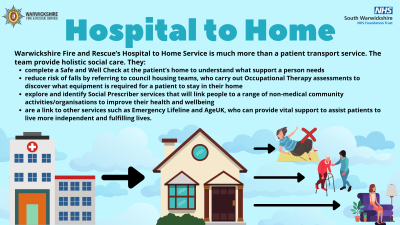
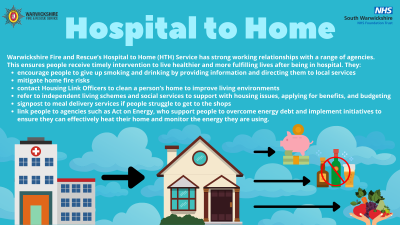
Tobacco Dependency Service
In line with the long term plan, the Trust has a dedicated Tobacco Dependency Service. The team visit wards daily to support patients, who are an inpatient and smoke, to stop smoking. They also refer patients, when they are discharged, on to secondary services to enable them to continue their therapeutic plan.
If a patient has been receiving support from the Tobacco Dependency Service while they are being treated / cared for in hospital for a condition and they are then discharged for that condition, the Tobacco Dependency Team will refer the patient onto a secondary service within the community.
The Tobacco Dependency Team works very closely with the secondary services, communicating all patients plans and requirements. The patient will then receive three months support following on from their management plan, which was originally put in place in hospital. This holistic plan includes support and guidance over the phone three times a week, with medications been sent through the post. Behavioural therapy is tailored and delivered through the phone calls, specifically looking at triggers and habits and support and guidance with regards to nicotine addiction.
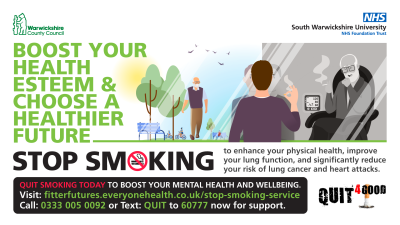
- Advice for carers
- Age UK Coventry and Warwickshire - Telephone: 02476 231999 or email: info
@ageukcovwarks.org.uk - Age UK Coventry and Warwickshire - Hospital Social Prescribing in Warwickshire
- Coventry and Warwickshire Partnership NHS Trust Resources - If you need mental health support now, the freephone telephone number 08081 966798 can be called 24 hours a day, 7 days a week by both service users and carers.
- Health and wellbeing resources
- NHS Coventry, Warwickshire and Solihull Talking Therapies Service - a free NHS service to help people with mild, moderate and moderate to severe symptoms of anxiety and low mood. Telephone: 02476 671090 or email: talkingtherapies
@covwarkpt.nhs.uk - Warwickshire & Solihull Community And Voluntary Action (CAVA) - Social Prescribing - Social prescribing involves taking time to identify with an individual what matters to them and then, in a person-centred way, connects someone to practical and emotional community support, which can empower and improve health and wellbeing.
- Warwickshire County Council's Adult Social Care Service - If you are not unwell, but you feel you are struggling to cope at home, please contact the service or in an emergency out of hours, call 01926 886922.
- Warwickshire County Council - Mental health and wellbeing
- Warwickshire County Council - help to live at home
- Wellbeing for Warwickshire - The service has a single phone number 0800 616171 and a single website which are available for Warwickshire residents to contact 24/7, 365 days a year.
- Leaving hospital when the time is right leaflet - Why it is important to start planning for you to leave hospital
- Moving or returning to another place of care leaflet - Why you are leaving hospital and what you might expect after you have left
- Returning home leaflet - Why you are leaving hospital and what you might expect after you have left
- Looking after family or friends after they leave hospital - Useful advice for family and friends of people needing ongoing care or support with day-to-day life
